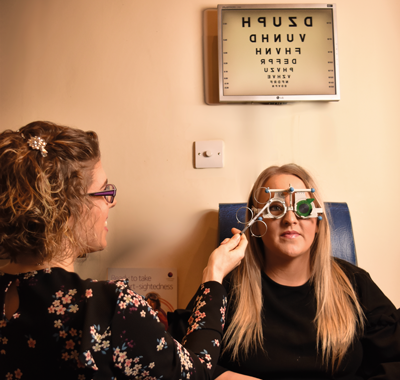The General Medical Council recognises that leadership and management is essential for every doctor, and provides guidance detailing management and leadership responsibilities [1]. Indeed, management and leadership is part of the core training for all medical trainees. However, to date, there is no equivalent guidance or mandatory training within optometry.
The optometry profession has perhaps historically discussed leadership and management mainly within the context of business and practice management, and as such has not engaged all clinicians. However, it is important for all optometrists to understand that in the face of NHS changes and increasing clinical responsibilities, leadership skills are essential to enable them to deliver a safe and efficient service to patients.
The changing role of the optometrist
The optometry profession has changed dramatically over the last 60 years. One of the most substantial changes is the shift towards optometrists managing ocular pathology in community practice, rather than referring all eye disease to secondary care. An optometrist can assume therapeutic prescribing rights, allowing further capacity to manage and treat patients. Increasingly, patients are being signposted to their optometrist due to the increasing pressures on general practice, and this is supported in many areas in England with a minor eye conditions service (MECS). This means that optometry practices and, indeed, individual optometrists, cannot operate in isolation. Rather, they should be viewed as one part of a wider complex healthcare system delivering patient care.

April 2017 heralded the publication by the Scottish Government of the Community Eyecare Services review [2]. This report sought to review current service delivery and recommended actions to help meet individual patient needs in Scotland. The review drew upon other recent reports including ‘Realistic Medicine’ [3] and the ‘National Clinical Strategy’ [4]. The overarching message from these reports is that services must continue to improve and develop over the next few years in order to meet the ever-changing needs of the Scottish population, in the backdrop of continued economic pressures. The community eyecare services review made it clear that this will require all optometrists “to have good leadership and management skills within the practice” [2].
Understanding that the optometrist works within a complex healthcare system underpins the reason why leadership skills are essential. It has been argued that effective clinicians are those who understand the systems they work in and who seek to improve those systems, rather than simply work harder within them [5]. In other words, effective clinicians engage in leadership to both deliver and improve the service they deliver.
But what is leadership?
The term leadership means different things to different people; it is difficult to find a definition which has unanimous consensus [5]. Leadership theories are abundant and have evolved over the last few decades. Whilst earlier literature describes leadership as an individual pursuit (one in which the acquisition of certain traits, such as charisma and self-confidence are the pre requisites for a good leader) more recent theories have promoted the idea of leadership as a process. This is a fundamental shift, as it moves the focus away from one individual and acknowledges the idea that whilst not everyone is necessarily a leader, everyone in the team can contribute to the leadership process [6]. It is this type of leadership, sometimes described as ‘shared leadership’ or ‘distributed leadership’, which is particularly useful where tasks are highly independent and complex – such as healthcare [7].
Considering leadership in these terms requires a mind shift for those who have always thought of leadership as simply a positional role. However, in the last few years there has been an abundance of work within medicine and other healthcare disciplines which can help us to understand this type of leadership and how it can be applied to optometric practice.
Leadership frameworks
The value of shared leadership within medicine has been understood for some time. In 2008 this gave rise to the Medical Leadership Competency Framework (MLCF), which was developed by the NHS Institute for Innovation and Improvement and the Academy of Medical Royal Colleges [8]. The MLCF outlines the competences that all doctors require to enable them to be actively involved in delivering and improving healthcare services. This framework was successfully embedded within both undergraduate and postgraduate training, and was widely adopted as the basis for leadership development. This success, coupled with strong support from other clinical groups, gave rise to the Clinical Leadership Competency Framework (CLCF), which retained the same five core domains, but now includes clinical examples of application in a wide variety of clinical settings [7].
The CLCF centralises on the idea that the aim of the healthcare team is to ‘deliver a service’. Within optometric practice, this is to deliver eyecare services to the public, including provision of eye examinations, contact lens services, dispensing spectacles and sometimes a range of other extended services. It is the idea of ‘shared leadership’ that underpins the CLCF, the idea is that the most successful services will be those who understand that everyone in the team can contribute to the leadership process. Each team member is enabled to partake in the leadership process by demonstrating the behaviours which are described in the five core domains: demonstrating personal qualities, working with others, managing services, improving services and setting direction. Each of the five core domains has four categories called ‘elements’ containing four competencies, which describe the activity or outcome to demonstrate (Figure 1).
Figure 1: The Clinical Leadership Competency Framework.
1. Demonstrating personal qualities
1.1 Developing self-awareness
1.2 Managing yourself
1.3 Continuing personal development
1.4 Acting with integrity
2. Working with others
2.1 Developing networks
2.2 Building and maintaining relationships
2.3 Encouraging contribution
2.4 Working within teams
3. Managing services
3.1 Planning
3.2 Managing resources
3.3 Managing people
3.4 Managing performance
4. Improving services
4.1 Ensuring patient safety
4.2 Critically evaluating
4.3 Encouraging improvement and innovation
4.4 Facilitating transformation
5. Setting direction
5.1 Identifying the contexts for change
5.2 Applying knowledge and evidence
5.3 Making decisions
5.4 Evaluating impact
‘Demonstrating personal qualities’ (domain 1) and ‘working with others’ (domain 2) include competencies that are clearly necessary for the clinician working in optometric practice, and indeed these competencies map well onto the professional standards set by the optometry regulator [9]. Perhaps these attributes are not always viewed through the lens of leadership, but it would be reasonable to suggest that all clinicians would see the value of these to delivering their service.
However, it is possible that the value of the proceeding domains (Managing services, Improving services, Setting direction) may not be so well understood, at least not at a practice-base level. Therefore, it is helpful to explain how these domains could apply to day-to-day optometric practice.
Imagine a small independent optometry practice with a single testing room. There are clinics running five days per week covered by one optometrist (independent prescriber), one receptionist and a practice manager. The clinics book at least two weeks in advance. The patient base is mainly elderly. The optometrist regularly works through lunch breaks and often has to ‘squeeze’ in emergency patients. This is resulting in a stressful working environment for the whole team, and is also putting patient safety at risk. How is this situation managed and whose responsibility is it? One solution is to do nothing, to accept the situation and just ‘work harder’ within the system. However, good leadership seeks to work smarter, not harder [5]. An alternative solution is to start ‘managing’ and ‘improving’ the service (domains 3 and 4). This will require skills such as auditing (to understand the current situation), identifying areas of waste, suggesting and implementing a change in the current service, and then evaluating the outcome (using improvement techniques).
It is essential that the optometrist understands that they can take an active role in contributing to this process, and not simply relinquish all responsibility to the practice manager. The value of the CLCF is that it helps to break down the elements of what a clinician will need to help improve their service.
Going forward
Aspects of the above example may resonate with many clinicians. However, viewing this and similar practice challenges through the lens of a shared leadership opportunity (involving different members of the team in service delivery and improvement) may be a new concept for many in optometric practice. In particular, it calls the clinician to look beyond the one-to-one clinical relationship within the consulting room and to engage in the wider leadership and management of their service [5]. Leadership is not simply reserved for those seeking a career in practice management or a designated ‘practice manager’. Rather, every clinician has an intrinsic leadership role and has responsibility to contribute to the effective running and improvement of their service [7].
Adopting such an approach may be challenging for the clinician, and success will depend on appropriate support and training to develop their leadership skills. It is no longer good enough just to be a good clinician, so many other skills are required to be a good healthcare professional. In line with medicine and other areas of healthcare, consideration must be given to providing training at all levels of experience. For example, within medicine, leadership training is a compulsory component of the curriculum for all medical trainees [1]. The Leadership and Management Programme (LaMP) is one example of a national course which was developed using the CLCF [10], and is available to medical trainees at an ST3 level or beyond (ST1-3 GP trainees), dental trainees, SAS doctors, consultants, GPs and optometrists across Scotland.
Summary
Delivering high quality and safe patient care is the mandate for all healthcare services, including optometry. Many optometrists will be aware of the tragic case involving Honey Rose, which resulted in the tragic death of a young boy. This alone highlights that it is vital for all optometrists to exercise good leadership skills within a practice setting to deliver high quality and safe care. Achieving that aim is not a ‘one-man job’, rather it requires an approach in which all the practice team is able to contribute toward the leadership process. It requires clinicians to actively engage with supporting, leading and managing their services. Once leadership is understood as an essential skill to deliver a safe and quality service, it is clear that no clinician is exempt.
References
1. Leadership and Management for all Doctors. General Medical Council 2012.
https://www.gmc-uk.org/guidance/
ethical_guidance/management_for_doctors.asp
2. Community Eyecare Services Review. Scottish Government
http://www.gov.scot/Publications/2017/04/7983
3. Chief Medical Officer’s Annual Report 2014-15, Realistic Medicine. Scottish Government 2016a.
4. A National Clinical Strategy for Scotland. Scottish Government 2016b.
5. Swanwick T, McKimm J. What is clinical leadership…and why is it important? The Clinical Teacher 2011.
6. Brocklehurst P, Ferguson J, Taylor N, Tickle M. What is clinical leadership and why might it be important in dentistry? British Dental Journal 2013;214:243-6.
7. Clinical Leadership Competency Framework. NHS Leadership Academy 2011.
8. Medical Leadership Competency Framework: Enhancing Engagement in Medical Leadership. NHSIII 2010.
9. Standards of Practice for Optometrists and Dispensing Opticians. General Optical Council 2017.
10. Leadership and Management Programme. NHS Education for Scotland.
www.lamp.nes.scot.nhs.uk
COMMENTS ARE WELCOME






